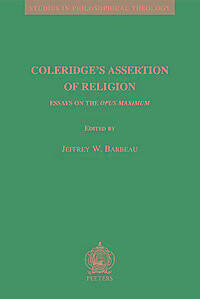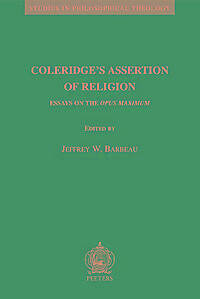
Bedankt voor het vertrouwen het afgelopen jaar! Om jou te bedanken bieden we GRATIS verzending (in België) aan op alles gedurende de hele maand januari.
- Afhalen na 1 uur in een winkel met voorraad
- In januari gratis thuislevering in België
- Ruim aanbod met 7 miljoen producten
Bedankt voor het vertrouwen het afgelopen jaar! Om jou te bedanken bieden we GRATIS verzending (in België) aan op alles gedurende de hele maand januari.
- Afhalen na 1 uur in een winkel met voorraad
- In januari gratis thuislevering in België
- Ruim aanbod met 7 miljoen producten
Zoeken
Omschrijving
Alternately titled the "Assertion of Religion," "the great work," "Logosophia," magnum opus, and the Opus Maximum, Samuel Taylor Coleridge's philosophical assertion of religion was often regarded as the work that would determine his permanent contribution to the history of ideas. Despite endless preparatory studies, however, Coleridge's plan to develop a unified system, drawing from philosophy, literature, theology, history, and the natural sciences, remained incomplete at his death. Coleridge's Assertion of Religion contains the first collection of original scholarship on the newly published Opus Maximum. While the language of the Opus Maximum is often complex and fragmentary, the essays in this volume open new avenues for future discussion of pivotal themes in Coleridge's writings, including careful analysis of Coleridge's conception of God and the Trinity, the human will, his relationship to Neoplatonism, and his unique defense of the human self through the connection between a mother and a child. The volume thereby contributes to the ongoing assessment of Coleridge's contribution to nineteenth-century Romanticism and his place in the history of ideas.
Specificaties
Betrokkenen
- Auteur(s):
- Uitgeverij:
Inhoud
- Aantal bladzijden:
- 312
- Taal:
- Engels
- Reeks:
Eigenschappen
- Productcode (EAN):
- 9789042917873
- Verschijningsdatum:
- 18/08/2006
- Uitvoering:
- Paperback
- Formaat:
- Trade paperback (VS)
- Afmetingen:
- 160 mm x 239 mm
- Gewicht:
- 557 g

Alleen bij Standaard Boekhandel
+ 161 punten op je klantenkaart van Standaard Boekhandel
Beoordelingen
We publiceren alleen reviews die voldoen aan de voorwaarden voor reviews. Bekijk onze voorwaarden voor reviews.









